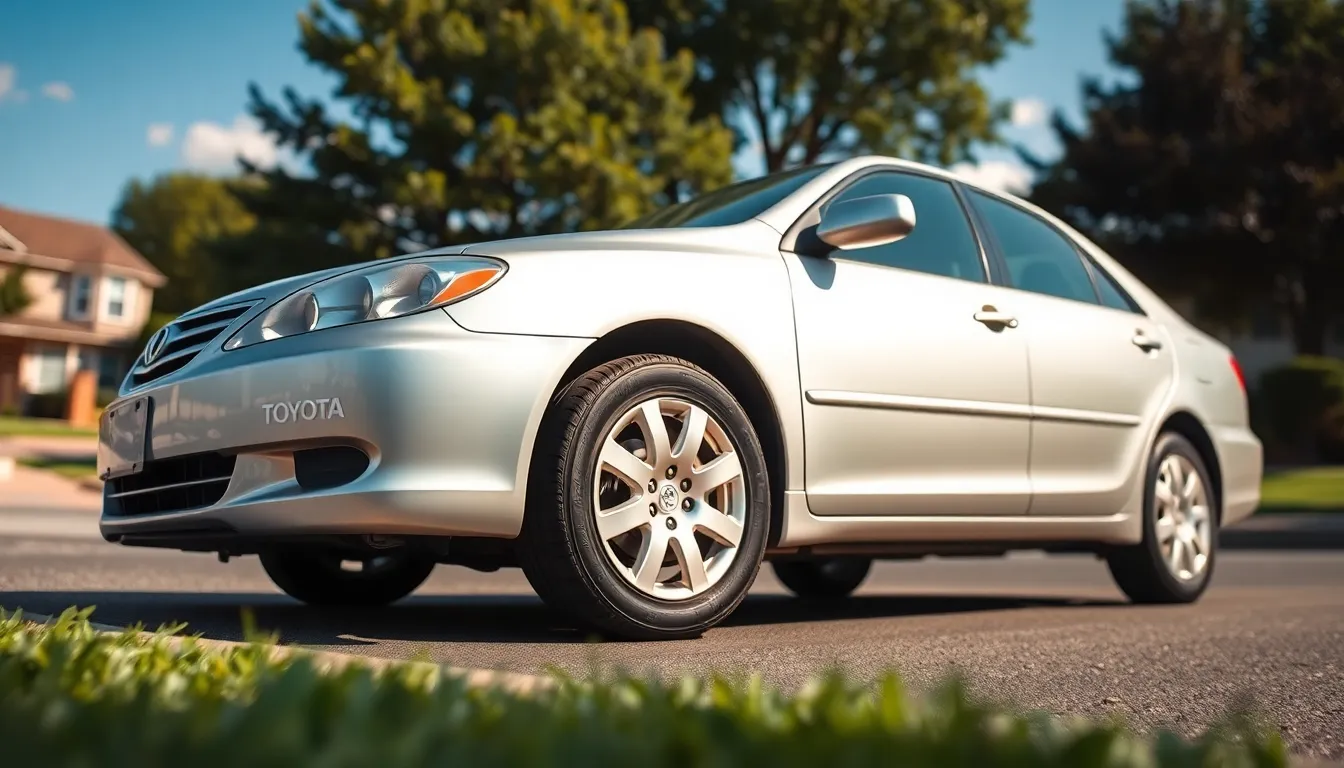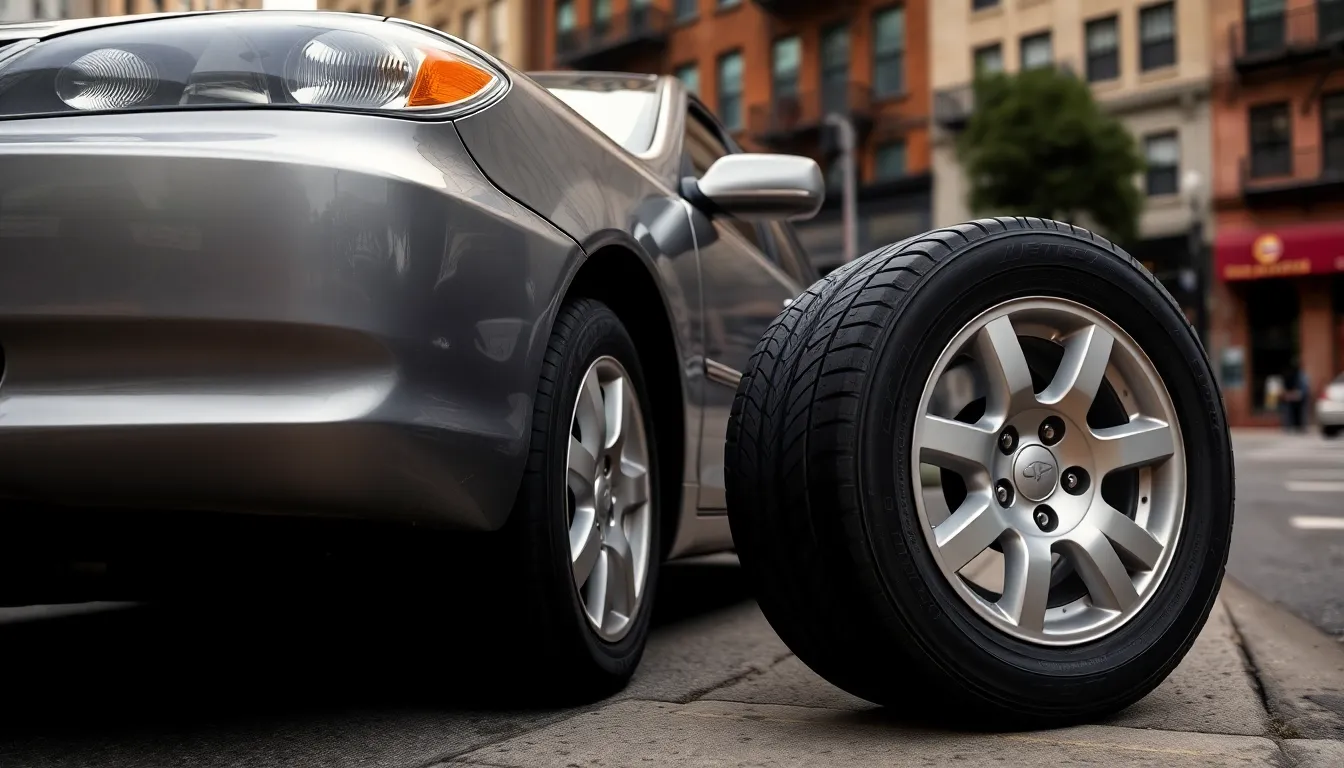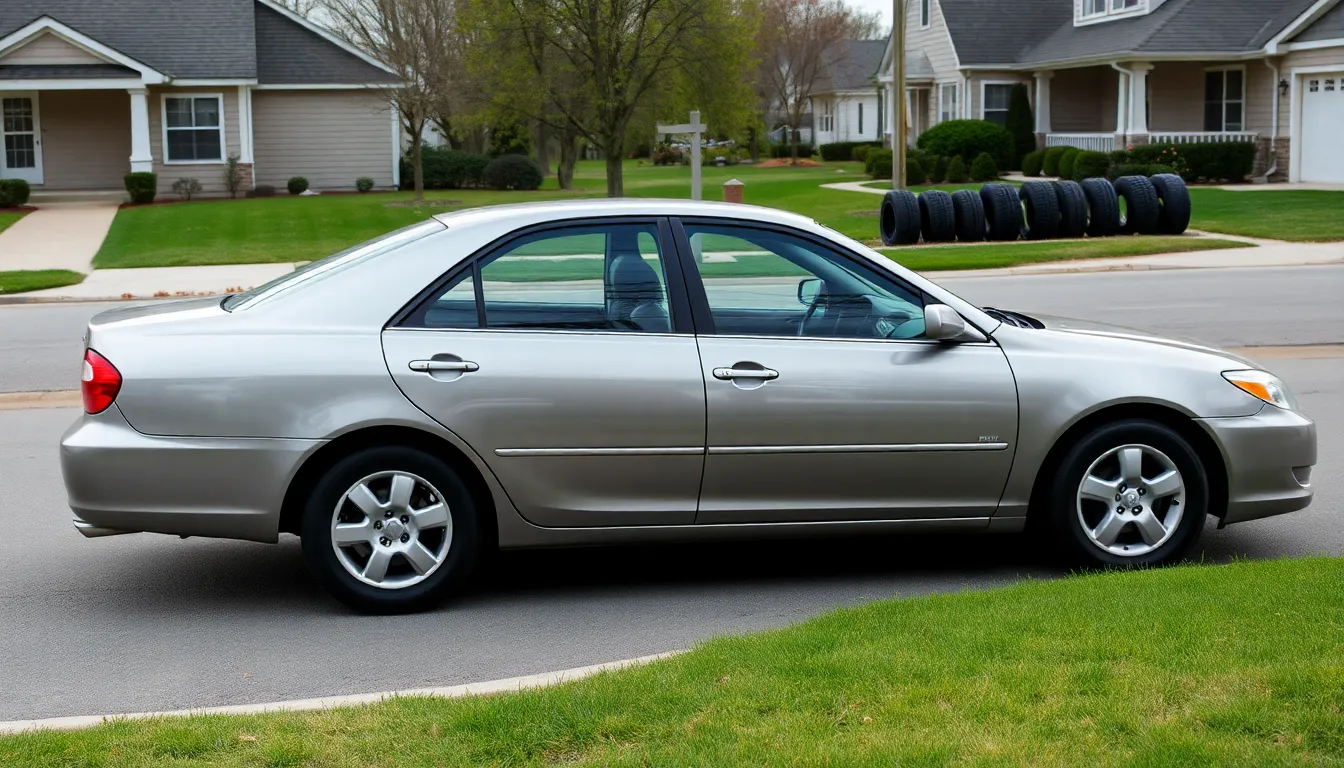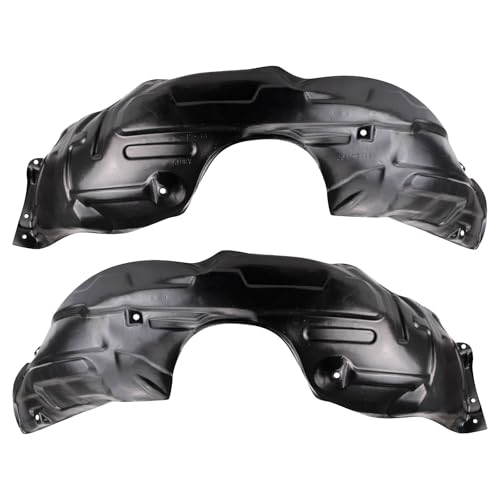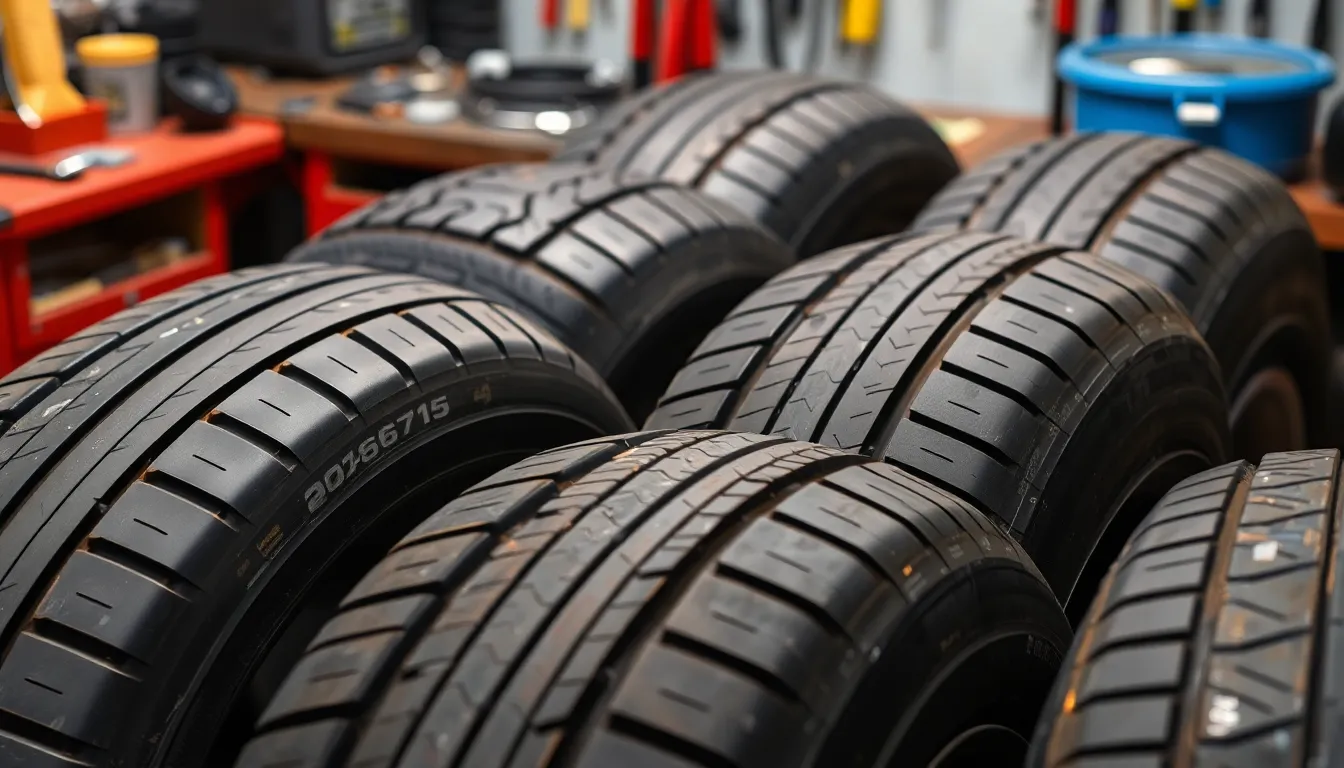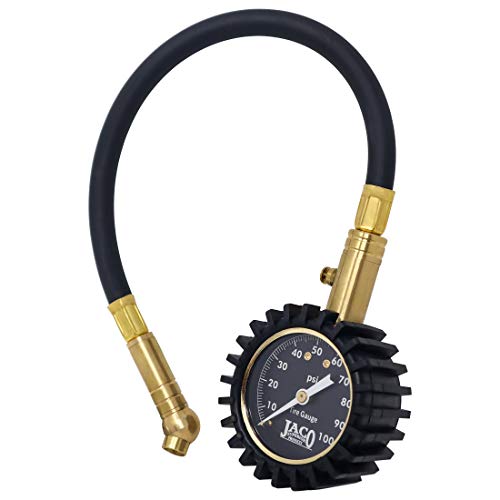Finding the right tire size for your 2002 Toyota Camry isn’t just about replacement – it’s about maximizing your vehicle’s performance safety and fuel efficiency. We understand how frustrating it can be to stand in a tire shop unsure whether you’re making the right choice for your trusted Camry.
Your 2002 Camry came with exact tire specifications that Toyota engineers carefully selected to deliver optimal handling comfort and longevity. Getting this right means smoother rides better gas mileage and avoiding costly mistakes that could affect your car’s alignment or speedometer accuracy.
We’ve compiled everything you need to know about 2002 Toyota Camry tire sizes including the factory specifications alternative options and what to consider when it’s time for replacement. Whether you’re dealing with worn treads or simply want to upgrade your driving experience we’ll guide you through making the perfect tire choice for your Camry.
Toyota Camry 2002 Factory Tire Specifications
Toyota engineers designed exact tire dimensions for the 2002 Camry to deliver balanced performance across all driving conditions. Our comprehensive analysis reveals the exact factory specifications that maintain your vehicle’s intended handling characteristics.
Standard Tire Size Options
The 2002 Toyota Camry came equipped with 205/65R15 tires as the primary factory specification across most trim levels. Base models and mid-level trims featured this size configuration, which provides an optimal balance of comfort and performance for daily driving needs.
| Trim Level | Tire Size | Aspect Ratio | Load Index | Speed Rating |
|---|---|---|---|---|
| CE | 205/65R15 | 65 | 92 | H |
| LE | 205/65R15 | 65 | 92 | H |
| XLE | 205/65R15 | 65 | 92 | H |
| SE | 215/60R16 | 60 | 95 | H |
SE trim models received 215/60R16 tires to complement their sportier suspension tuning and enhanced handling characteristics. These wider tires improve cornering stability while maintaining the manufacturer’s safety standards.
All factory tire specifications include H-speed ratings, supporting sustained speeds up to 130 mph under normal operating conditions. Load indices of 92 or 95 indicate maximum weight capacities of 1389 pounds and 1521 pounds per tire respectively.
Rim Diameter and Width Requirements
Factory wheel specifications for the 2002 Camry accommodate 15-inch diameter rims on base through XLE models with a width measurement of 6 inches. SE models feature 16-inch diameter wheels measuring 6.5 inches in width to support the larger tire footprint.
Bolt patterns remain consistent across all trim levels at 5×114.3mm spacing, ensuring compatibility with aftermarket wheel options that match these specifications. Offset measurements range from +45mm to +50mm depending on the exact wheel design and trim level.
Center bore diameter measures 60.1mm on all factory wheels, requiring hub-centric rings when installing aftermarket wheels with larger center bores. Proper fitment maintains the vehicle’s intended weight distribution and prevents vibration issues during operation.
Wheel weight varies between 14 and 18 pounds per unit depending on the exact model and construction materials used in manufacturing. Lighter wheels reduce unsprung weight and can improve acceleration response and braking performance.
Performance Impact of Different Tire Sizes
Tire size changes directly affect your 2002 Camry’s performance characteristics across multiple driving aspects. Understanding these impacts helps you make informed decisions when selecting replacement tires.
Fuel Economy Considerations
Wider tires like the 215/60R16 found on SE models create increased rolling resistance compared to the standard 205/65R15 configuration. This resistance forces the engine to work harder during acceleration and cruising, resulting in marginally reduced fuel efficiency. Larger rim sizes also add unsprung weight to each wheel assembly, further impacting your vehicle’s fuel economy performance.
Factory-recommended tire sizes optimize aerodynamics and rolling efficiency for your Camry’s design specifications. Maintaining the original equipment size ensures you retain the fuel economy ratings Toyota engineered into the vehicle. Deviating from these specifications typically results in measurable decreases in miles per gallon, particularly during highway driving conditions.
Handling and Ride Quality Changes
Larger rims with lower profile tires deliver enhanced cornering stability and steering response due to reduced sidewall flex during turns. The 215/60R16 configuration on SE models provides noticeably sharper handling characteristics compared to the standard 205/65R15 setup. Lower profile sidewalls transmit steering inputs more directly to the road surface, creating a more connected driving experience.
Ride quality varies significantly between tire configurations on your 2002 Camry. Standard 205/65R15 tires feature taller sidewalls that absorb road irregularities more effectively, providing a softer and more comfortable ride quality. Lower profile alternatives like 215/60R16 transmit more road imperfections into the cabin, resulting in a firmer ride that some drivers find less comfortable during extended highway travel.
Braking performance improves with larger wheel and tire combinations due to stiffer sidewall construction and enhanced contact patch characteristics. The reduced sidewall flex in 16-inch configurations provides more consistent braking feel and potentially shorter stopping distances compared to 15-inch alternatives.
Compatible Tire Size Alternatives
We recommend staying with your 2002 Toyota Camry’s original tire sizes for optimal performance and safety. Direct same-size replacements maintain the vehicle’s engineered balance of comfort, handling, and fuel efficiency that Toyota designed for each trim level.
Plus Sizing Options
Plus sizing allows Camry owners to upgrade from smaller wheels to larger ones while maintaining the overall tire diameter. Moving from the LE’s 205/65R15 to the SE’s 215/60R16 represents the most common upgrade path for this vehicle.
Upgrading to 17-inch wheels opens additional sizing options like 215/55R17 or 225/50R17. These configurations require wheels with the correct bolt pattern of either 5×100 or 5×114.3, depending on your exact model year. Proper offset becomes critical, with ET50 being the OEM specification and ET45 to ET50 acceptable for aftermarket applications.
Professional consultation ensures proper fitment when plus sizing, as clearance issues can occur with brake calipers, suspension components, or wheel wells. Speedometer accuracy may also require adjustment since changes in overall tire diameter affect odometer readings.
Winter Tire Recommendations
Winter tires perform best when matching your Camry’s original tire size. LE models benefit from 205/65R15 winter tires, while SE and XLE trims require 215/60R16 sizing for optimal traction and vehicle dynamics.
Look for tires displaying M+S (Mud and Snow) or 3PMSF (Three-Peak Mountain Snowflake) ratings when selecting winter rubber. These certifications guarantee the tire meets exact snow traction standards established by industry testing protocols.
Some drivers consider narrower winter tires for enhanced snow penetration, but this approach isn’t standard practice for Camrys. Professional guidance becomes essential if you’re considering non-standard winter tire sizing, as changes can affect ABS systems, traction control, and overall vehicle stability.
Always verify your exact tire size using the door jamb sticker or owner’s manual before purchasing winter tires, as trim-exact variations exist within the 2002 model year.
Best Tire Brands for 2002 Toyota Camry
We’ve researched the market to identify quality tire options that deliver reliable performance for your 2002 Camry. These recommendations balance cost considerations with performance characteristics for different driving priorities.
Budget-Friendly Options
Budget conscious drivers can find several reliable tire options that maintain quality without excessive cost. Blackhawk Street-H HH11 205/65R15 94H BSW offers the longest warranty in this category at 50,000 miles, providing excellent value for extended use.
Zeetex ZT3000 205/65R15XL 99H BSW delivers solid performance with a 45,000-mile warranty, making it suitable for drivers seeking dependable daily commuting tires. The XL designation indicates extra load capacity for heavier driving conditions.
Zenna Sport Line 205/65R15 94H BSW provides a more affordable entry point with a 40,000-mile warranty. This option works well for drivers with moderate annual mileage who prioritize initial cost savings.
All budget options feature the standard 205/65R15 size that fits LE trim models perfectly. These tires maintain H-speed ratings for highway driving while offering substantial warranty coverage.
Premium Performance Tires
Performance oriented drivers benefit from premium tire options that extend tread life and enhance driving characteristics. Vercelli Strada I 205/65R15 94H BSW and Lancaster LP-16 205/65R15 94H BSW both offer 60,000-mile warranties, representing the longest coverage available for the Camry’s tire size.
Achilles Touring Sport A/S 205/65R15 94H BSW provides 55,000-mile warranty coverage with enhanced all-season performance characteristics. This tire balances extended tread life with improved wet weather traction.
Premium tires typically feature advanced tread compounds that resist wear while maintaining consistent performance throughout their service life. These options justify higher initial costs through extended replacement intervals and superior handling characteristics.
| Tire Brand | Warranty Miles | Size | Speed Rating |
|---|---|---|---|
| Blackhawk Street-H HH11 | 50,000 | 205/65R15 | H |
| Zeetex ZT3000 | 45,000 | 205/65R15XL | H |
| Zenna Sport Line | 40,000 | 205/65R15 | H |
| Vercelli Strada I | 60,000 | 205/65R15 | H |
| Lancaster LP-16 | 60,000 | 205/65R15 | H |
| Achilles Touring Sport A/S | 55,000 | 205/65R15 | H |
Installation and Maintenance Tips
Installing the correct tire size on your 2002 Toyota Camry ensures optimal performance and safety. Following proper maintenance practices extends tire life and maintains driving quality.
Matching tires across all four wheels maintains consistent handling characteristics. Installing tires of identical size type and speed rating prevents uneven wear patterns and handling issues. Wheel alignment and balancing after installation eliminates vibration and promotes even tread wear across the tire surface.
Monthly tire inspections catch potential problems before they become safety hazards. Examining tires for cuts bulges or embedded objects like nails prevents sudden failures. Rotating tires every 6,000 to 8,000 miles ensures even tread wear distribution and maximizes tire lifespan.
Proper Tire Pressure Guidelines
The 2002 Toyota Camry requires 29 to 30 psi for optimal performance across most trim levels. Checking the door placard or owner’s manual provides the exact pressure specification for your exact configuration. Cold tire measurements deliver the most accurate readings since driving heats tires and increases pressure.
Maintaining equal pressure in all four tires ensures stable handling characteristics. Temperature fluctuations affect tire pressure with every 10-degree change altering pressure by approximately 1 psi. Adjusting pressure seasonally compensates for temperature variations and maintains proper contact with the road surface.
Underinflated tires increase rolling resistance and reduce fuel efficiency. Overinflation reduces the tire’s contact patch and compromises traction while creating uneven wear patterns. Regular pressure checks every month prevent both conditions and maintain your Camry’s engineered performance balance.
When to Replace Your Tires
Tread depth measurement determines when tires reach replacement time. The legal minimum of 2/32 inch tread depth provides minimal traction in wet conditions. Visible tread wear indicators appear as bars across the tire grooves when replacement becomes necessary.
Age affects tire safety regardless of remaining tread depth. Replacing tires over six years old prevents age related failures even when tread appears adequate. Rubber compounds deteriorate over time reducing grip and structural integrity.
Immediate replacement becomes necessary when structural damage appears. Cuts bulges or cracks in the sidewall compromise tire integrity and create blowout risks. Separating tread or belt damage requires immediate attention to prevent sudden tire failure while driving.
Conclusion
Getting the right tire size for your 2002 Toyota Camry isn’t just about fitting wheels to your car—it’s about maintaining the engineering balance that Toyota designed into your vehicle. Whether you stick with the factory 205/65R15 for most trims or the sportier 215/60R16 for the SE model you’ll preserve optimal fuel efficiency safety and ride quality.
We’ve covered everything from budget-friendly options to premium performance tires plus sizing possibilities and essential maintenance practices. Remember that your door jamb sticker holds the definitive answer for your exact trim level and consulting with tire professionals ensures you make the best choice for your driving needs.
Your 2002 Camry can deliver years of reliable service with proper tire selection and maintenance. By following manufacturer specifications and staying proactive with inspections and replacements you’ll keep your vehicle performing at its best while maximizing both safety and value.
Frequently Asked Questions
What is the standard tire size for a 2002 Toyota Camry?
The standard tire size for most 2002 Toyota Camry trim levels is 205/65R15. However, the SE trim features wider 215/60R16 tires for enhanced handling. All factory tires have H-speed ratings supporting speeds up to 130 mph. Always check your door jamb sticker or owner’s manual to confirm the exact tire size for your specific trim level before purchasing replacements.
Can I use different tire sizes on my 2002 Camry?
While alternative tire sizes are possible through plus sizing, it’s recommended to stick with factory specifications for optimal performance and safety. Plus sizing allows larger wheels while maintaining overall tire diameter consistency. However, any size changes should be done with professional consultation to ensure proper fitment and avoid affecting vehicle systems like speedometer accuracy.
How do different tire sizes affect fuel efficiency?
Wider tires like the 215/60R16 increase rolling resistance, causing the engine to work harder and reducing fuel efficiency. Factory-recommended tire sizes are optimized for aerodynamics and fuel economy. Maintaining original tire specifications helps preserve the vehicle’s engineered balance between performance, comfort, and fuel consumption that Toyota engineers designed for your Camry.
What tire pressure should I maintain for my 2002 Camry?
The recommended tire pressure for a 2002 Toyota Camry is 29 to 30 psi for optimal performance. Check tire pressure monthly using a reliable gauge, as proper inflation prevents uneven wear and maintains handling characteristics. Underinflation or overinflation can negatively impact fuel efficiency, tire longevity, and vehicle safety, so regular monitoring is essential.
When should I replace my 2002 Camry tires?
Replace tires when tread depth reaches the legal minimum of 2/32 inch or if they’re over six years old, regardless of tread condition. Use the penny test to check tread depth – if Lincoln’s head is visible when inserted upside down, replacement is needed. Immediately replace tires showing structural damage like cuts, bulges, or sidewall cracks to prevent dangerous blowouts.
What are the best tire brands for a 2002 Toyota Camry?
Budget-friendly options include Blackhawk Street-H HH11, Zeetex ZT3000, and Zenna Sport Line, offering 40,000-50,000 mile warranties. Premium performance choices include Vercelli Strada I, Lancaster LP-16, and Achilles Touring Sport A/S with up to 60,000 mile warranties. Premium tires feature advanced tread compounds for enhanced durability and performance, justifying their higher initial costs.
Do I need special winter tires for my 2002 Camry?
For winter driving, match your original tire size for best performance. Look for tires with M+S (Mud and Snow) or 3PMSF (Three Peak Mountain Snowflake) ratings for proper snow traction. Base models should use 205/65R15 winter tires, while SE trims need 215/60R16. Avoid non-standard sizing without professional guidance, as it can affect vehicle systems and safety.
How does wheel size affect my Camry’s performance?
Larger wheels (16-inch on SE models) provide better cornering stability and steering response but may reduce ride comfort. Standard 15-inch wheels offer more comfortable rides due to taller sidewalls that absorb road imperfections better. Larger wheel and tire combinations also improve braking performance, providing more consistent braking feel and potentially shorter stopping distances.

